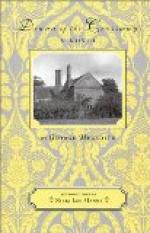It is final. She is at liberty, in the meantime,
to draw on my bankers for the provision she may need,
at the rate of five hundred pounds per annum.”
He spoke of “the lady now bearing my name.”
He was within an inch of saying “dishonouring.”
I swear I heard the “dis,” and he caught
himself up. He “again declined any attempt
towards reconciliation.” It could “only
be founded on evasion of the truth to be made patent
on the day of trial.” Half his talk was
lawyers’ lingo. The fellow’s teeth
looked like frost. If Lot’s wife had a
brother, his name’s Warwick. How Diana
Merion, who could have had the pick of the best of
us, ever came to marry a fellow like that, passes my
comprehension, queer creatures as women are!
He can ride; that’s about all he can do.
I told him Mrs. Warwick had no thought of reconciliation.
“Then, Sir Lukin, you will perceive that we have
no standpoint for a discussion.” I told
him the point was, for a man of honour not to drag
his wife before the public, as he had no case to stand
on—less than nothing. You should
have seen the fellow’s face. He shot a
sneer up to his eyelids, and flung his head back.
So I said, “Good-day.” He marches
me to the door, “with his compliments to Lady
Dunstane.” I could have floored him for
that. Bless my soul, what fellows the world is
made of, when here’s a man, calling himself
a gentleman, who, just because he gets in a rage with
his wife for one thing or another—and past
all competition the handsomest woman of her day, and
the cleverest, the nicest, the best of the whole boiling—has
her out for a public horsewhipping, and sets all the
idiots of the kingdom against her! I tried to
reason with him. He made as if he were going
to sleep standing.’
Sir Lukin gratified Lady Dunstane by his honest championship
of Diana. And now, in his altered mood (the thrice
indebted rogue was just cloudily conscious of a desire
to propitiate his dear wife by serving her friend),
he began a crusade against the scandal-newspapers,
going with an Irish military comrade straight to the
editorial offices, and leaving his card and a warning
that the chastisement for print of the name of the
lady in their columns would be personal and condign.
Captain Carew Mahony, albeit unacquainted with Mrs.
Warwick, had espoused her cause. She was a woman,
she was an Irishwoman, she was a beautiful woman.
She had, therefore, three positive claims on him
as a soldier and a man. Other Irish gentlemen,
animated by the same swelling degrees, were awaking
to the intimation that they might be wanted.
Some words were dropped here and there by General
Lord Larrian: he regretted his age and infirmities.
A goodly regiment for a bodyguard might have been selected
to protect her steps in the public streets; when it
was bruited that the General had sent her a present
of his great Newfoundland dog, Leander, to attend on
her and impose a required respect. But as it
chanced that her address was unknown to the volunteer
constabulary, they had to assuage their ardour by
thinking the dog luckier than they.




